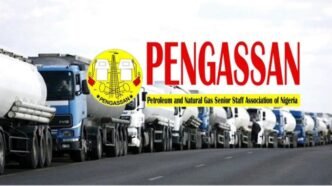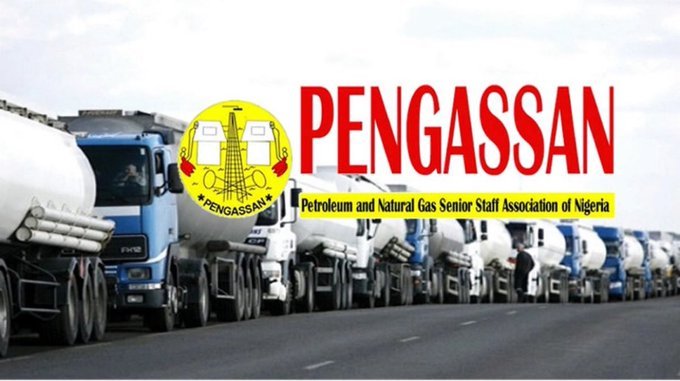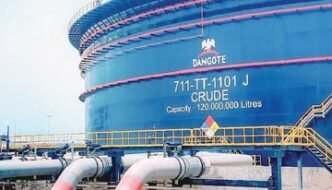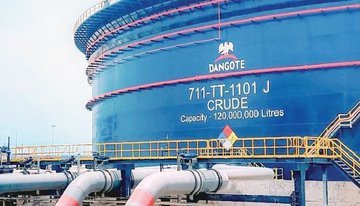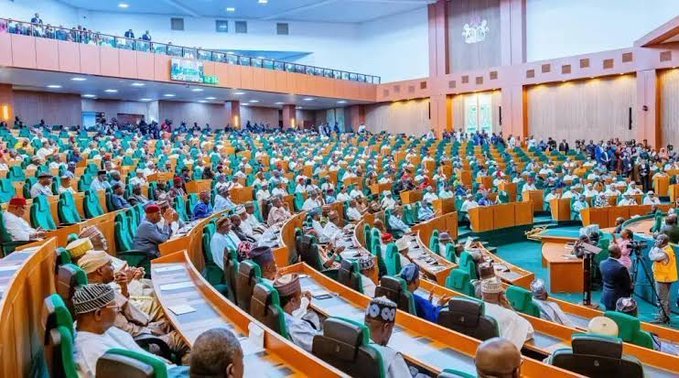The labour dispute between the Petroleum and Natural Gas Senior Staff Association of Nigeria (PENGASSAN) and the Dangote Petroleum Refinery has escalated dramatically, as the union has issued a directive for its members to immediately halt gas supply and shut all crude oil valves to the facility.
The directive, contained in a letter signed by PENGASSAN’s General Secretary, Comrade Lumumba Ighotemu Okugbawa, accused the refinery of anti-labour practices, particularly the dismissal of workers who joined the union.
Union’s Position
In the strongly worded letter, PENGASSAN said the management of Dangote Refinery had taken steps that violated the rights of workers to freely associate and unionize. Instead of engaging the union in meaningful dialogue, the company allegedly opted for “misinformation and propaganda” to justify its decision.
“We bring you fraternal greetings from the National Secretariat. As you are aware, the Management of Dangote Petroleum Refinery has disengaged our members in reaction to the exercise of their constitutional right to being unionized. They have gone further on a mission of misinformation and propaganda to justify this illegitimacy rather than engaging meaningfully with us to right the wrong,” the letter read.
The union’s leadership then gave a direct order:
“Consequent to these, you hereby directed to cut off gas supply to NGIC effective immediately. All crude oil supply valves to the Refinery should be shut. The loading operation for vessels headed there should be halted immediately.
NGIC Chairman, ensure that gas supply to the Refinery is cut off effective immediately. All chairmen on this summon are to report promptly the progress of the directive. Kindly accept the assurances of our highest esteem regards. Thank you. Injury to one, Injury to all.”
Rising Tensions
This directive signals a sharp escalation in the ongoing conflict between Dangote Petroleum Refinery and organised labour. Just days ago, PENGASSAN accused the company of sacking more than 800 Nigerian workers allegedly for joining the union. The association described the move as an “unjust and insensitive corporate decision,” threatening nationwide solidarity action if the matter was not addressed.
Now, with the decision to halt supply of critical resources to the refinery, PENGASSAN has moved beyond protests into direct action that could have immediate consequences on the refinery’s operations and, by extension, Nigeria’s fuel market.
A Refinery in Crisis
The Dangote Refinery, valued at over $19 billion, was commissioned with high hopes of transforming Nigeria’s energy sector by reducing reliance on imported refined petroleum products. However, the project has faced multiple challenges, from funding difficulties and construction delays to regulatory disputes and, more recently, labour unrest.
The refinery had already been in the spotlight after announcing the suspension of petrol sales in naira from September 28, 2025. The company explained that it had exhausted its crude-for-naira allocation, making it unsustainable to continue selling fuel in local currency. That move raised concerns about dollarisation of fuel transactions and the possibility of petrol prices climbing above N900 per litre.
Now, the added pressure of a union-led supply shutdown poses an even greater risk to its ability to meet production targets.
Economic Implications
The Dangote Refinery is seen as central to Nigeria’s economic stability, particularly in the downstream petroleum sector. Any disruption in its operations is likely to create ripple effects across the country.
Analysts warn that halting gas and crude supply could cripple refinery output in the short term, limiting its capacity to process products and distribute them to the domestic market. With Nigeria already grappling with fluctuating fuel prices and foreign exchange scarcity, the union’s directive could further destabilise the system.
Dr. Kenechukwu Eze, an energy economist based in Abuja, explained: “This is a very dangerous development. Dangote Refinery is not just any private business; it is at the heart of Nigeria’s energy security strategy. If PENGASSAN succeeds in cutting off supply, we could see disruptions in product availability, price surges, and panic buying at petrol stations.”
He added that the government would likely be forced to step in to mediate between the union and the refinery to prevent a full-blown crisis.
Political and Labour Dimensions
The refinery’s dispute with PENGASSAN also has a political dimension. The administration of President Bola Tinubu has placed significant emphasis on reforms in the oil and gas sector, touting the Dangote Refinery as a flagship project that would reduce the country’s dependence on imported refined petroleum products.
But the labour dispute is now threatening those ambitions. By sacking union members, PENGASSAN argues, the refinery has not only violated workers’ rights but also undermined the government’s broader reform agenda.
Labour experts say the situation could set a precedent for how multinational corporations operating in Nigeria handle unionisation efforts. If the Dangote Refinery succeeds in sidelining union members without consequences, other companies may follow suit. Conversely, if PENGASSAN prevails, it could strengthen union influence across the oil and gas industry.
Broader Labour Unrest
The dispute also comes at a time of heightened industrial tension across Nigeria. Multiple unions in the energy sector have raised concerns about job losses, poor working conditions, and the impact of government reforms on their members. The Nigeria Labour Congress (NLC) and Trade Union Congress (TUC) have both expressed solidarity with PENGASSAN, warning of wider action if the refinery fails to reinstate the dismissed workers.
For PENGASSAN, the motto “Injury to one, injury to all” underpins its latest directive, signalling that the union sees the issue as a fight not just for its members at the Dangote Refinery but for the broader rights of Nigerian workers in the petroleum industry.
What Next?
The coming days will be critical in determining the outcome of this standoff. If PENGASSAN’s order is fully implemented, the Dangote Refinery could face immediate operational paralysis. That would not only impact the company but also disrupt supply chains and push fuel prices even higher.
The federal government, already under pressure to manage rising inflation and a volatile foreign exchange market, will be closely watching developments. Intervention, either through mediation or regulatory enforcement, may be necessary to avert a crisis that could affect millions of Nigerians.
Industry insiders say dialogue remains the only sustainable solution. “The refinery and the union need to sit down at the table,” said an executive from an independent petroleum marketers’ association who requested anonymity. “Without compromise, everyone stands to lose—workers, the company, and most importantly, ordinary Nigerians who will bear the brunt of higher fuel costs.”
Conclusion
The PENGASSAN directive to shut down gas and crude supply to the Dangote Refinery marks a turning point in an already volatile situation. What began as a dispute over workers’ rights has now snowballed into a confrontation with national economic implications.
As things stand, the refinery is caught between financial constraints, labour unrest, and growing public scrutiny. Unless urgent steps are taken to resolve the dispute, Nigeria could be on the brink of another fuel supply crisis—one that threatens both energy security and economic stability.

